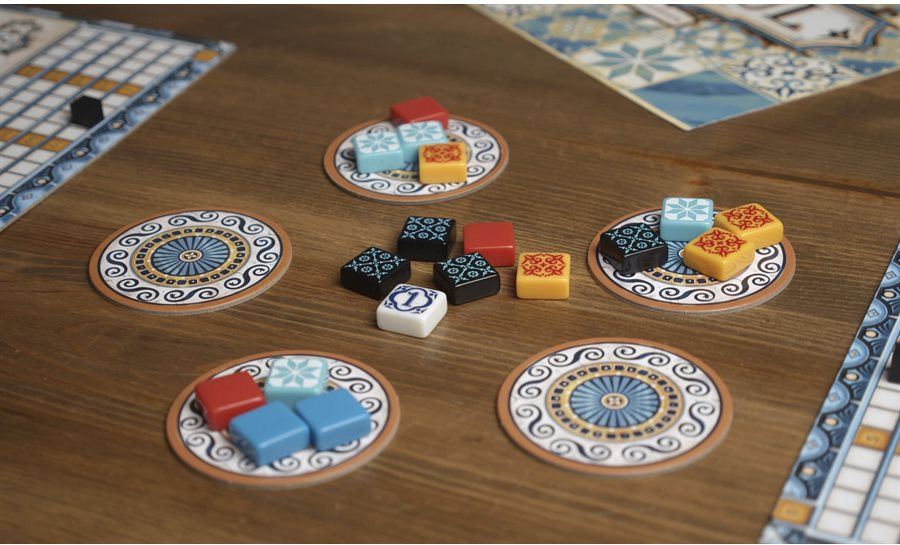Admired greatly when it first hit the shelves, Azul is a game of tactile joy and simple mechanics. Underneath this sheen of abstract mundanity lies one one of the most cutthroat games you are ever going to play. The game is designed Michael Kiesling with art by Phillipe Guerin and Chris Quilliams.
The game as it is laid out seems gentle. The bag of tiles click, clacks as you shake it. The tiles clatter on the table as you arrange them into factories on beautiful round bits of cardboard. Pick a factory. Pick a colour. Take all the tiles of that colour and slide them into place on your board. The rest disappear to the middle of the table forming a factory all of their own.
As they click clack into place you fill your board. 5 rows await you, each one larger than the last, capable of taking a few more precious tiles. Holding only one colour at a time, you must make your choices with all the information for this round open and in front of you. Mistakes will be made.
 Beautiful thing this game
Beautiful thing this gameThe factories empty, fall silent. The completed rows you have built become a single tile of the same colour, sliding into your mosaic. As they click, and clack, into place you accumulate points based on adjacency to other tiles. Once a player fills a row the game comes to an end. Points are scored. Victory is declared.
Sounds unremarkable. Plain. Boring almost. I find this to be an issue with Azul. It is hard to describe a game like this without spoiling the surprise of emergent play.
Let us wrap around to the beginning. Pick a factory, place tiles on a row. Wash, rinse, and repeat. I need two blue tiles to finish this row but 3 are left in one factory. I must take all the tiles of that colour when I choose a factory. One of those tiles is going to clatter and smash to the floor. Negative points for me. You can manipulate these factories, entrap your opponents, and set yourself up to benefit from your deceptions.
The negative points track for smashed tiles also comes into play when determining the first player. The middle factory starts with a single tile in it, different to all the other tiles in the game that when chosen gives you the initiative on the next round. It cannot be placed in any row and instead just smashes to the ground. Advantage and disadvantage in one move.
As tiles smash they become exponentially more negative: the more you smash, the worse each tile hits your points. In leaping to the front of the pack you open yourself up to disaster. In ignoring it you may end up with scraps.
 Did past you make decision you are now regretting?
Did past you make decision you are now regretting?Now placement. Take the tiles from the factory and stick them in a row. Simple enough? Not only do we want to fill a row without smashing tiles so we can fill out our mosaic, we want to do so in such a way that the tile we place is adjacent to others already placed. In doing so our reward is more points.
As the mosaic fills up my options narrow. For instance if I have already filled the red tile in my mosaic on a given row, I can no longer take red tiles to that row. In filling out my mosaic I give you a weapon to attack me with.
It’s becoming clearer now isn’t it? What was a simple matter of filling rows and placing tiles, becomes a cut and thrust duel. You know what colours I need. You know which rows I have full. You know what I can’t take.
With all this open knowledge, and a little bit of counting, this game gets nasty. Factories become bombs waiting to go off. Those lovely tiles suddenly feel heavier as you have to pick up more than you can take. You duck and dive, choosing when to take the hit and when to press your advantage. Every choice you make now, shuts off a decision later. A debt that future you better work out how to pay.
Azul is an odd abstract game. It approaches you with a smile on its face. It carries an invitation in hand to clack the bag of tiles, fill your boards, and satisfyingly slot things into place. You don’t see the knife until it is too late. This seemingly gentle premise gives way to a tense,exciting game where every decision you make can be a gut punch to your opponents. You’ll laugh as an opportunity comes your way, remonstrate with those who leave you holding all the tiles you can’t take, and curse past you for their terrible decisions.
It’s a beautiful game, and simple to teach. That moment when someone starts playing it and realises the potential of the space they have been given to play in, is one of those exquisite gaming moments that boardgames should always provide.
 Games
Games How to resolve AdBlock issue?
How to resolve AdBlock issue? 


















